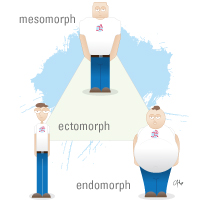Food. Put it in your mouth, chew it up, and swallow. Let your body’s biochemistry do its magic by breaking it down and deriving usable energy from it. Move around, expending said energy. Rinse. Repeat.
The Evolutionary Context of Nutrition
Rewind a couple of million years, and this process worked seamlessly. Our species ate to survive, moved to hunt and gather, and instinctively balanced calories consumed with calories expended. Excess caloric intake was rare, usually happening in anticipation of food scarcity, such as during harsh winters. During these periods, humans stored energy as fat, a biological adaptation critical for survival.
On a genetic level, our species is a product of this evolutionary environment. For millennia, food scarcity shaped our bodies, making them efficient at conserving energy. This evolutionary advantage, however, now presents a challenge: our bodies are excellent at storing fat but resistant to shedding it, a trait that feels less advantageous in today’s world of abundant food.
These systems, as frustrating as they might seem, are the reason our species has survived. The work of experts like Lyle McDonald delves deeply into this topic, providing valuable insights into how our bodies handle nutrition and energy storage.
The Agricultural Shift and Obesity
Roughly 10,000 years ago, humans transitioned from a hunter-gatherer lifestyle to agricultural societies. This shift brought food stability and abundance but also marked the beginning of sedentary living. With technological advancements, especially over the last century, modern conveniences like cars, computers, and fast food have compounded this sedentary trend. The human body, still primed for survival during famine, struggles in this environment of constant caloric excess.
Obesity isn’t a modern phenomenon—it has been traced back as far as 25,000 years. However, its prevalence skyrocketed in the 1970s and 1980s, coinciding with significant dietary and lifestyle changes. Today, it's not uncommon to see individuals carrying 150 pounds of excess body fat, equating to over 500,000 stored calories. Without dietary and exercise intervention, these reserves often remain untouched.
The Role of Education in Nutrition
Addressing these issues requires education. Nutrition basics are not just for those with significant weight to lose but for anyone looking to improve health, prevent obesity, or optimize body composition. This knowledge empowers individuals to make informed choices rather than falling victim to fad diets and pseudoscience.
Avoiding Quick Fixes
The diet industry thrives on quick fixes, offering gimmicky solutions that promise dramatic results in unrealistic timeframes. These approaches prey on desperation, offering "magic" solutions without addressing the root causes of poor health. Instead of falling for these traps, focus on evidence-based strategies that promote sustainable change.
The Principles of Long-Term Success
Successful nutrition isn’t about rigid rules like “eat this, not that.” It’s about understanding and applying principles that work universally across populations. These principles, rooted in science and reason, guide individuals toward lasting success. They include:
1. Balancing caloric intake and expenditure.
2. Prioritizing nutrient-dense foods over empty calories.
3. Recognizing the importance of macronutrient distribution.
4. Avoiding extremes and finding a sustainable approach.
The Importance of Being an Informed Consumer
Modern consumers must navigate a landscape filled with misinformation. From deceptive advertising to pseudoscientific claims, the nutrition world is rife with pitfalls. Being informed means seeking evidence-based advice, questioning claims, and avoiding decisions driven by emotions or marketing hype.
Building a Strong Foundation
The goal isn’t to find a one-size-fits-all diet but to build a foundation of knowledge that allows for flexibility and adaptation. This foundation empowers individuals to make choices aligned with their goals, whether that’s weight loss, performance enhancement, or general health improvement.
Moving Forward
Embracing these principles requires a shift in mindset. It’s not about seeking shortcuts but committing to a process guided by reason, objectivity, and evidence. This approach might not offer instant gratification, but it delivers sustainable results and true control over your health journey.
So, whether you’re aiming for better health, improved performance, or a leaner physique, start by understanding the basics. This knowledge is your most powerful tool in achieving your goals.













